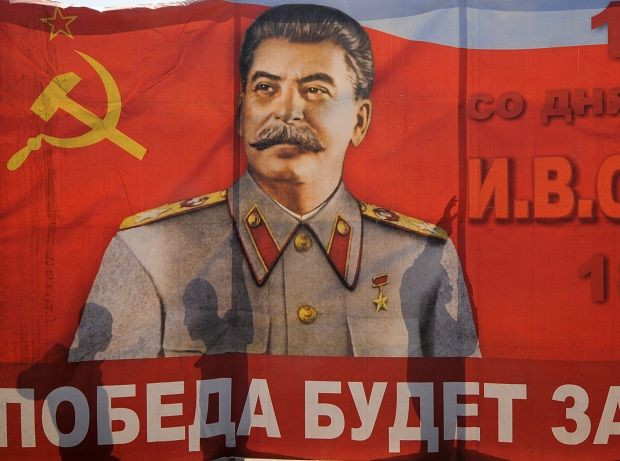Joseph Stalin, Still A Hero To Some In Russia And Georgia

Joseph Stalin, who died 60 years ago, may have been a bloodthirsty killer who destroyed at least two generations of Russian society, but that doesn’t mean he doesn’t enjoy some level of popularity, even adulation, is some parts of the former Soviet Union.
In Stalin’s native Georgia, which is now an independent republic, a small crowd of elderly people gathered in front of the former dictator’s home in the village of Gori to commemorate his passing.
Among a decreasing population of elderly, diehard Communists in both Georgia and other parts of the former USSR, Stalin remains a hero.
“Comrades, we have gathered here to remember the great leader,” Alexandre Lursmanashvili, chairman of Gori’s Community Party, said at the memorial service, according to Eurasia.net, before a solemn crowd.
Stalin’s appeal, however, may extend beyond the community of aging Bolsheviks,
A study commissioned by the Carnegie Endowment for International Peace indicated a surprisingly robust support for Stalin across Georgia and Russia.
Stalin “remains in a prominent tomb in Red Square in the heart of Moscow, his image is on sale in flea markets in Russia and Georgia, his portrait is carried in political rallies,” wrote Thomas de Waal, senior associate at the endowment's Russia and Eurasia Program.
“In 2012, Stalin held first place in a poll of great figures in Russian history. In 2013 buses carried his image as Russians marked the seventieth anniversary of the Battle of Stalingrad in the city of Volgograd, which had been renamed Stalingrad for the day.”
The endowmen'ts study indicated that in Stalin’s home of Georgia, 45 percent of the public have positive attitudes toward him, while more than two-thirds (68 percent) described him a “wise leader.”
In addition, 38 percent of Armenians, many of whom credit Stalin for having saved hundreds of thousands of their compatriots from the Turkish genocide, agreed with the comment: “Our people will always have need of a leader like Stalin, who will come and restore order.”
Lev Gudkov, director of the Levada Center, a Moscow polling firm, attributed part of Stalin’s popularity to what it perceives as a failure of current leader Vladimir Putin.
“[Stalin] made us famous,” an elderly woman in Gori told EurasiaNet. “He was born here, in our town, he built a great, beautiful country and then he saved the world from Nazi Germany. Did any other Georgian do anything that even comes near to that?”
A Gori youth told the news service that Stalin "was a great man, they say. Our grandparents are so in love with him that he must have done something good.”
Indeed, Gori city officials are planning to restore a statue of Stalin to the city center. It was removed in the summer of 2010 by the then-pro-western government of President Mikheil Saakashvili.
The people of Gori, which houses a museum dedicated to Stalin, are split over the legacy of their most famous (and infamous) native son.
Olga Tochishvili, a local guide, told BBC, "In Georgia, most of the old generation like Stalin. They think he was a great statesman, with his small mistakes. Young people don't like Stalin, of course. Our young people are not interested in history and they don't like Stalin."
Nikoloz Kapanadze, 65, who lives in Gori and was only five when Stalin died, said he was upset at the removal of the statue.
"Everybody wants that, not only me, but the whole of Gori, the whole of Georgia wants the monument to be installed where it was before … I've only heard good things about him throughout my life."
Damien McGuinness, a BBC correspondent, wrote: “Stalin is Georgia's most famous son. And in a culture which reveres strong personalities, that counts for a lot."
The current mayor of Gori, David Razuadze, of the Georgian Dream party, which seeks to repair relations with Russia, said, "Georgia is known worldwide because of Stalin. And the position of the previous government, which was basically an insult, was unbearable. And I say, you can condemn Stalin's period, you can condemn political repressions and the old way of life -- but you should not touch personalities."
Of course, some Gori citizens don't share this adoration of Stalin.
Giorgi Kandelaki, an MP from Saakashvili's party, told the BBC, “We lost the elections and so unfortunately we have many signs of democratic backsliding in Georgia or flirtations with the Soviet past. And the comeback of this statue is one such symbolic but very worrying sign. And in Gori the decision to allocate funds to reinstate the statue [of Stalin] was made not by some private people but by the city council and by the local governor, who represents the ruling council. I think this is a scandalous fact."
Kandelaki, 31, added, "No country that aspires to become a normal country can have a symbol that pays tribute to Stalin. Everyone in the world knows Stalin as the bloodiest dictator in history. And the second reason relates specifically to Georgia. In 1921, when Georgia was a parliamentary democracy, Stalin was the initiator of the Soviet Russian invasion and occupation of Georgia."
Meanwhile, in Moscow, thousands of diehard Stalinists, including Communist Party boss, Gennady Zyuganov, laid flowers at Stalin’s his tomb, praising him for his “great victories.”
© Copyright IBTimes 2024. All rights reserved.





















